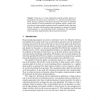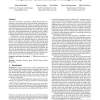141 search results - page 1 / 29 » Heap Assumptions on Demand |
CAV
2008
Springer
13 years 6 months ago
2008
Springer
Termination of a heap-manipulating program generally depends on preconditions that express heap assumptions (i.e., assertions describing reachability, aliasing, separation and shar...
APLAS
2010
ACM
13 years 2 months ago
2010
ACM
Live heap space analyses have so far been concerned with the standard sequential programming model. However, that model is not very well suited for embedded real-time systems, wher...
OOPSLA
2010
Springer
13 years 3 months ago
2010
Springer
Heap Abstraction with Demand-Driven Axiomatization of Memory Invariants Isil Dillig Thomas Dillig Alex Aiken Stanford University lig Thomas Dillig Alex Aiken Symbolic Heap Abstract...
ASPLOS
2006
ACM
13 years 8 months ago
2006
ACM
The goal of this paper is to propose a scheme that provides comprehensive security protection for the heap. Heap vulnerabilities are increasingly being exploited for attacks on co...
PUC
2006
13 years 4 months ago
2006
Abstract. The Stanford Event Heap has been shown to provide appropriate support for constructing interactive workspace applications. Given this success it is natural to consider th...


